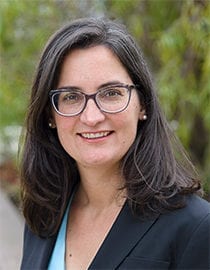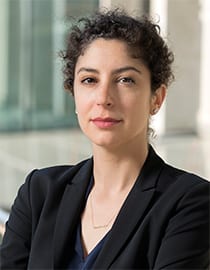
By Gwyneth K. Shaw
President Joe Biden’s new administration has already outlined a long list of early priorities. With help from a science- and technology-focused think tank, Berkeley Law Professors Catherine Crump and Rebecca Wexler are pushing forward their policy ideas.
Through the Public Interest Tech Accelerator run by the Day One Project and New America, Crump and Wexler produced briefs based on their scholarly research. Both are faculty co-directors of the Berkeley Center for Law & Technology.

Crump’s ideas revolve around ensuring that local law enforcement agencies obtain the approval of local elected representatives before deploying surveillance technology funded by the federal government. Wexler wants to rebalance the asymmetry of access to electronic evidence and other sensitive information, which is often withheld from defendants based on privacy statutes that empower law enforcement to investigate evidence of guilt — but bar defense counsel from investigating evidence of innocence.
The Day One Project is on a mission to develop and share “catalytic” ideas in science and technology policy, and to work with Congress and the administration. The organization runs several accelerators open to academics, students, entrepreneurs, and policymakers — anyone with new ideas.
Wexler and Crump say they are especially drawn to the opportunity now, with new leadership in the White House, federal agencies, and U.S. Senate committees.
“The Biden administration has said that criminal justice reform is one of its top priorities,” says Crump, who is also the director or Berkeley Law’s Samuelson Law, Technology & Public Policy Clinic. “It has additionally prioritized science by elevating the Office of Science and Technology Policy to the cabinet level. This seems like the perfect time to promote needed reforms at the intersection of criminal justice and technology policy.”
Curbing secret surveillance
Her proposal concerns the ability of local law enforcement agencies to access surveillance technology that’s much more powerful than what was available to the federal government a few decades ago. As the pace of these technologies have accelerated, so has access, she says — sometimes without the full knowledge of elected leaders. But these technologies can raise important questions, including about freedom of speech, that voters might want their elected officials to weigh in on.
“It’s not something we want law enforcement agencies to decide on their own,” Crump says.
The initial idea was sparked by an outcry in Oakland after the City Council created a center to synchronize surveillance data with almost no public debate or commentary. Crump’s 2016 paper examining that case, and a related incident in Seattle, forms the basis of the Day One policy brief.
“When I looked into those examples more closely, it became clear the money for this technology was coming from the federal government. These are large programs generally created to combat terrorism, but also used to fund surveillance technology to fight crime,” she says. “This is an example of taking an idea that was most fully expressed in a scholarly work and trying to find a way to bridge the gap into policy.”
Crump’s solution is mandating full local approval of new surveillance technology through federal grants, to ensure buy-in. She stresses that a community’s tolerance for these tools could vary widely, and largely hinges on the people’s relationship with their local government, particularly law enforcement.
“It’s the public’s rights that are at stake here,” she says. “Given the potential cost of these technologies, is there a benefit to them? When you start these conversations, you get really interesting discussions about what the technology can do and what people want from it.
“People want to solve crime, and these technologies can be useful. But there is a cost.”
Cracking evidence open
Wexler, too, has been writing about her proposal for some time, including in a forthcoming Harvard Law Review paper that explores interpretation of the Stored Communications Act by the U.S. Department of Justice and the federal courts. That reading — which allows courts to block subpoenas from defendants to gain access to online communications, even if the prosecution is allowed to review them same communications — goes against U.S. Supreme Court precedent, Wexler argues.
In the effort to protect consumer data privacy, she says, lawmakers inadvertently privileged prosecutors.

“The fact that privacy laws are unintentionally making it easier to find evidence of guilt than find evidence of innocence is just something that lawmakers have overlooked,” she says. “But the good news is, there’s an easy fix.”
Wexler co-authored her Day One Project paper with UCLA Professor John Villasenor, who is also a professor of electrical engineering, marketing, and public policy. They make a case for bringing symmetry to these situations by making sure prosecutors and defendants can access the same information.
Wexler says it’s realistic that this plan could get through Congress during the current two-year session, especially since she expects multiple bills concerning privacy to be under consideration. During the last session, U.S. Rep. Mark Takano (D-Calif.) leveraged help from Wexler and Professor Andrea Roth to write legislation addressing another facet of the problem: Access to proprietary forensic algorithms that are often used to make a case against a defendant.
“This is a repeated pattern in existing bills. My hope is that when Congress is looking at this slew of new bills, they will see what we’ve proposed and make that small tweak so the next batch of legislation doesn’t include this,” Wexler says. “The momentum is really building. These are well-intentioned bills, and with this the next crop can be even better.”
Loully Saney, the Day One Project’s policy and strategic communications advisor, calls the ideas from Crump, Wexler, and Villasenor “proposals for action to address structural disparities in the criminal justice system and democratize police adoption of surveillance technology.”
“With a new Congress and Administration setting the agenda and defining priorities for the months ahead, there is a unique opportunity to advance policy on public interest technology issues,” she says. “Technology is moving faster than ever and we need bold new ideas like these.”